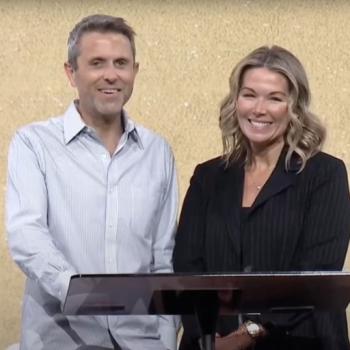Surprise! Approval of same-sex marriage has risen sharply among Americans in just a few years—according to one poll, from 41 percent in favor in 2004 to nearly 60 percent now. Surprise!
Some surprise. The same media trumpeting this change lately worked hard to bring it about. Major sectors of the communication industry, both news and entertainment, have served as advocates for same-sex marriage, and the present situation reflects their handiwork. Don't be bashful, guys, stand up and take the credit you deserve!
In fairness to the media, most of them undoubtedly think backing gay marriage is a good thing to do. When moral consensus breaks down in a society, as it has in America today, people's built-in impulse to organize life in moral categories moves them to seek new objects of moral concern. Thus we get things like the attempt to ban oversized soft drink containers by decree. For Americans egged on by media, the legalization of same-sex marriage is another, less risible instance of the same thing.
The media didn't act alone. Judges, educators, and clergy programmed by ideology have joined politicians prompted by expediency to do their bit. But the media have been the loudest mouthpieces for gay marriage—shock troops of the culture war, promoting the cause relentlessly.
Preceded by a barrage of coverage and commentary lecturing it on what it should do, the U.S. Supreme Court during Holy Week heard oral arguments in two gay marriage cases. Its decision will come in late June.
While it would be hazardous to predict the result, no one will be tremendously surprised if the justices take a states' rights approach—upholding California's Proposition 8 banning gay marriage in that state but overturning the Defense of Marriage Act that recognizes only man-woman unions as marriages for purposes of federal law.
But no matter how these cases turn out, that plainly will not be the end of it. Since the Supreme Court is unlikely, at least for the moment, to discover in the Constitution a fundamental right for homosexual couples to marry, pressuring the court to do so will become a priority for gay rights activists and their media friends. And if President Obama gets to name one or two more justices to the court, it could happen in just a few years.
One reason gay rights groups and the media have made such progress lately can be found in the failure of traditional marriage supporters to offer a compelling account of the threat that recognizing same-sex marriage poses to traditional marriage.
But consider. Statistics and everyday observation both underline the fact that marriage is in trouble in America today. Fewer and fewer Americans even bother to marry. Part of the cause is the widespread collapse of agreement on what marriage is.
The traditional understanding is this: marriage is a monogamous, permanent relationship between a man and a woman, grounded in sexual complementarity and intended for the begetting and raising of children and the mutual love and support of the spouses. One or more essential elements of that definition are eradicated by society's toleration of no-fault divorce, infidelity . . . and same-sex marriage.
This isn't to say that all those who want to enter into such unions wish to undermine traditional marriage. Most are simply seeking what everyone seeks in marriage—happiness—and who can blame them for that?
But natural human sympathy doesn't justify equating an ersatz version of marriage with genuine marriage. If that isn't deeply harmful to traditional marriage in these confused times, what in heaven's name is?
12/2/2022 9:05:38 PM




